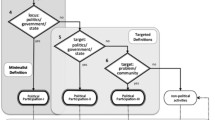Abstract
Doctoral candidates in political science have a universe of potential career options to choose from. These include not only academia, but also the non-governmental sector, political consulting, and government work. When I obtained my doctoral degree in 1993, little did I imagine that within fifteen years I would have tried my hand in all of these fields, including serving as a cabinet minister. In this article, I reflect on how this professional whirlwind came about, how each field helped and/or hindered the others, what these wanderings taught me about post-communist democratic politics, and particularly what lessons a political scientist learned from entering, albeit briefly, the ‘real world’ of politics.
Similar content being viewed by others
References
Auers, D. and Ikstens, J. (2005) ‘The Democratic Role of Political Parties’, in J.Rozenvalds (ed.) How Democratic Is Latvia: Audit of Democracy, Riga: LU Akademiskais Apgads, pp. 89–98.
Birckenbach, H.-M. (1997) Preventive Diplomacy through Fact-Finding: How International Organisations Review the Conflict Over Citizenship in Estonia and Latvia, Hamburg: Lit Verlag.
Dorodnova, J. (2003) ‘Challenging ethnic democracy: implementation of the recommendations of the OSCE high commissioner on national minorities to Latvia, 1993–2001’, CORE Working Paper 10, Hamburg: Centre for OSCE Research.
Karklins, R. (2005) The System made Me do it: Corruption in Post-Communist Societies, London: M.E. Sharpe.
Latvian Centre for Human Rights and Ethnic Studies. (2004) ‘Report to the European Monitoring Centre Against Racism and Xenophobia, Minority Education in Latvia’, available at http://eumc.europa.eu/eumc/material/pub/RAXEN/4/edu/CC/EDU-Latvia-final.pdf.
Muiznieks, N. (1995a) ‘The influence of the Baltic popular movements on the process of Soviet disintegration’, Europe–Asia Studies 47 (1): 3–25.
Muiznieks, N. (ed.) (1995b) Latvia. Human Development Report 1995, Riga: UNDP.
Muiznieks, N. (ed.) (1996) Latvia. Human Development Report 1996, Riga: UNDP.
Muiznieks, N. (ed.) (1997) Latvia. Human Development Report 1997, Riga: UNDP.
Muiznieks, N. (2006) ‘Government Policy and the Russian Minority’, in N. Muiznieks (ed.) Latvian–Russian Relations: Domestic and International Dimensions, Riga: LU Apgads, pp. 11–21.
Muiznieks, N. and Brands Kehris, I. (2003) ‘The European Union, Democratization, and Minorities in Latvia’, in P.J. Kubicek (ed.) The European Union and Democratization, London: Routledge, pp. 30–55.
Tisenkopfs, T. (ed.) (2001) Latvia Human Development Report 2000/2001: The Public Policy Process and Human Development, Riga: UNDP.
Walton, E.J. (2005) ‘The persistence of bureaucracy: A meta-analaysis of weber's model of bureaucratic control’, Organization Studies 26 (4), pp. 569–600.
Wilson, A. (2005) Virtual Politics: Faking Democracy in the Post-Soviet World, New Haven: Yale University Press.
Author information
Authors and Affiliations
Rights and permissions
About this article
Cite this article
Muiznieks, N. A Political Scientist's Experience in the Real World of Politics. Eur Polit Sci 8, 68–78 (2009). https://doi.org/10.1057/eps.2008.17
Published:
Issue Date:
DOI: https://doi.org/10.1057/eps.2008.17




